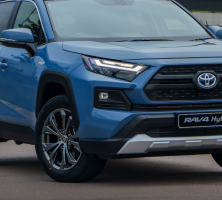
— A Toyota RAV4 adaptive headlights lawsuit should allegedly be dismissed because customers were never charged for the headlights. That is one of the arguments Toyota puts forth in a motion to dismiss the class action lawsuit.
According to the Toyota RAV4 adaptive headlights lawsuit, the 2022 RAV4 was supposed to have the headlights that “adjusts the direction of the beam to illuminate more of the road around corners and curves.”
Plaintiff Sharlene Shu filed the RAV4 class action lawsuit in August 2022 after receiving a letter from Toyota about the adaptive headlights.
The lawsuit was amended in December 2022 when three New York plaintiffs (Mark Tengowski, Roman Sivion, Mohamed Almakaleh) were added to the class action.
All four plaintiffs own 2022 Toyota RAV4 SUVs.
According to the class action, Toyota discovered certain models of the 2022 RAV4 SUVs equipped with premium packages had window stickers (Monroney labels) which inadvertently listed adaptive headlights. However, those 2022 vehicles did not contain adaptive headlights.
The plaintiffs contend Toyota falsely advertised the adaptive headlights so RAV4 customers would overpay for the SUVs.
Motion to Dismiss the Toyota RAV4 Lawsuit
Toyota argues the entire adaptive headlights class action should be dismissed, and the automaker begins by arguing plaintiff Shu doesn't claim she even tried to discuss the matter with Toyota before she filed the class action.
Toyota also mentions how the plaintiff didn't sue until Toyota informed her about the window sticker errors.
The plaintiff alleges it took Toyota eight months to tell her the RAV4 was not equipped with adaptive headlights, and the automaker never offered to refund her or make repairs to the vehicle.
However, Toyota points to the letter it sent customers which explained they were not charged for adaptive headlights.
Toyota says it mailed affected 2022 RAV4 owners this letter:
“It has recently come to our attention that the Monroney Label (‘window sticker’) on your vehicle indicated that Adaptive Front Headlight System — LED Projector Headlights with Auto Level Control and Auto On/Off feature was included. The feature is not standard on your model and the price was not included in the MSRP.”
There would allegedly be no need for a refund if the customer wasn't charged for the feature in the first place.
Toyota also argues the majority of the class action claims sound in fraud, but the "plaintiffs come nowhere close to satisfying" the heightened pleading requirements.
The plaintiffs allegedly do not identify with specificity what particular marketing materials they saw prior to their purchases that caused them to believe their RAV4s would have adaptive headlights.
Toyota alleges the plaintiffs use only general terms about relying on dealership advertisements at the dealerships or on a website. Toyota says this isn't good enough to claim fraud because the plaintiffs do not provide details about which website they looked at.
And Toyota argues the plaintiffs fail to allege which particular representation was made on that website.
Attorneys for Toyota also argue the plaintiffs failed to provide the automaker with the required notice that they were going to file the lawsuit. The plaintiffs also allegedly fail to allege Toyota had pre-sale knowledge of the alleged misstatements.
"To the contrary, the sole fact indicating knowledge of the inadvertent error on the Monroney label—any letter sent to customers—was necessarily sent after the sale took place." — Toyota
The Magnuson–Moss Warranty Act claim allegedly fails because "there is no federal jurisdiction over putative MMWA class claims where there are fewer than 100 named plaintiffs."
In its motion, Toyota asserts the plaintiffs cannot state a claim for breach of an express warranty under New York or California law because "they do not describe the specific, written statement that plaintiffs saw before their purchase that created the alleged warranty."
And Toyota further argues the plaintiffs fail to allege the RAV4 SUVs are unfit for their intended purposes of providing transportation as no plaintiffs allege they cannot drive their RAV4s.
The Toyota adaptive headlights class action lawsuit includes these vehicles.
- 2022 Toyota RAV4 Prime
- 2022 Toyota RAV4 SE Hybrid
- 2022 Toyota RAV4 XSE
- 2022 Toyota RAV4 XSE Hybrid
- 2022 Toyota RAV4 XLE
- 2022 Toyota RAV4 XLE Hybrid
- 2022 Toyota RAV4 XLE Premium
- 2022 Toyota RAV4 XLE Premium Hybrid
- 2022 Toyota RAV4 Adventure
- 2022 Toyota RAV4 TRD Off-Road
- 2022 Toyota RAV4 Limited
- 2022 Toyota RAV4 Limited Hybrid
The Toyota RAV4 adaptive headlights lawsuit was filed in the U.S. District Court for the Northern District of California: Sharlene Shu, v. Toyota Motor Sales USA, Inc., et al.
The plaintiffs are represented by Gutride Safier LLP.




